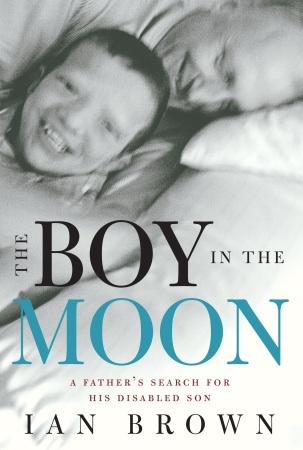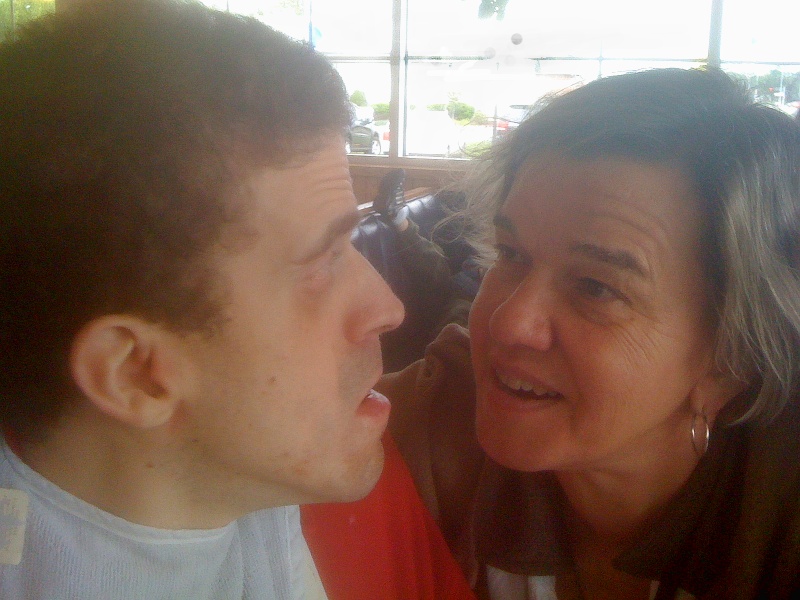eMy guest blogger returns! Here’s a book review from my husband.
What we can learn from people like Gus
by Mike Knezovich
As many of you are lucky to know, Beth has a knack for giving poignant, thoughtful gifts. She was true to form this past Father’s Day when she gave me a book called The Boy in the Moon. I just finished it. And what a read.
Beth doesn’t mention our son Gus very often in these blog posts of hers. Like other parents, we love our son. Think about him. Worry about him. But loving a child who has severe disabilities can be difficult to explain, so we tend not to try.
As for me, I admit I wonder what people think of what it’s like raising a son like Gus. I can get angry if I detect pity — or condescension — toward Gus, toward me and Beth, or the unspoken wonder that we could love a kid like Gus. And I can get hurt if people don’t ask or don’t know how to ask about our son. And then, when they do, sometimes they don’t really want to hear the answer.
Over time, I have come to understand that Gus, and life with him, simply had to be a mystery to others. After all, our son’s life has been—at least in real time—something of a mystery to me. Gus lived with us at home for 16 years, and all that time I had no way of telling others what it was like. And I have no way of telling people what it is like having him live away from us, either.
Now I don’t have to. Ian Brown, a writer for the Toronto Globe & Mail, has done it for me, and he’s done it better than I could hope to in his book The Boy in the Moon. So here’s a request: Go out and buy The Boy in the Moon. And read it as soon as you can fit it into your schedule.
I’m not asking you to do this just for me and Beth and Gus. I do admit to selfish motives, though. If you read this book—which is the author’s account of raising and trying to understand his son Walker, who has a rare genetic disorder that leaves him with multiple disabilities—you will know what it has been like raising Gus. Ian Brown’s accounts are superbly written and uncannily similar to my memories—from receiving the genetic diagnosis to the 16 years of sleep deprivation to what it was like to parade around hyper-normal places like Disney World when things are not normal.
But more than that, you will understand why it all was worth it. As the author writes about his son Walker, “Everything about him compels me, unless it terrifies me, and sometimes it does both.”
The first half or so of the book covers Brown’s experience as a parent and a husband, but the rest is a look at what disabled people like Gus and Walker have to offer the rest of us. What they can teach us. You might be skeptical that they can. Or anticipate saccharine platitudes. I understand. But it’s richer and more complicated than that.
Beth and I and other families and caretakers know that people like Walker and Gus teach us extraordinary things. This book explains how and why better than I can—I hope you’ll read it.


I think I heard this author interviewed on NPR. Thanks for the reminder, I’ll look up his book.
I look forward to reading “The Boy In The Moon”.
Mike, thank you so much for your post. Even though our son, Jason, died in 1992 we had hime with us for 19 years. He was born severely brain injured due to a birthing accident. He could not walk, talk, feed himself, we even had to help him with every bowel movement. We have experienced every emotion you and Beth have felt and are still feeling.
For five years we had a home therapy program for Jason in which members of our community and students from our two-year college participated. Some of the students volunteered for just one quarter others for a year. One psycology professor gave his students extra credit if they would keep a journal while working with Jason. They had to write about their feelings about working with a disabled child. They also had to record their reactions about me and my interaction with Jason. We still have a few of those journals and are in touch with a couple of those students.
Many of our students came to college undecided as to their major but we know of eight students who became physical therapists or special education teachers as a result of working with Jason. We are still in touch with five of them.
We were privileged to watch most of these young people develop a new emotional maturety that maybe came sooner then it would have normally.
One of the things that Dick and I always mention about Jason is that he was a wonderful teacher. Students and community members learned something about what it’s like to deal with different aspects of living with a disabled child. We learned about frustration, anger, dissapointment on levels we never knew possible but we also learned about overwhelming awe and love we still carry with us today.
Thanks Marcia. What you relate I think is part of what the book gets at. The author of this book does a really good job of explaining how being around these folks helps outline qualities of our own lives that we wouldn’t otherwise think about. It’s not simply a matter of being grateful that we’re not disabled–but that these folks can change what you think is important.
We have several friends with disabled children, and I have found they like you have trouble explaining there feelings but say the same as you they have taught you so much. I am anxious to get the book.
Thank you,
Penn
I hope like the book as much as I did, Penn. Thanks for reading.
Great post! Always enjoy your guest appearances Mike. And what a beautiful comment from Marcia! Looking forward to presenting this ‘must read’ to book club!
You know, it sounds like this would be a *great* book club book. The book club I’m in only reads paperbacks, and unfortunately “Boy in the Moon” is only available in hardcover so far — I can’t even find an audio version yet. With all these positive comments to Mike’s blog post, though, it sounds like book sales might soar – the book will get so popular that a paperback/audio version will have to be released soon!
Thank you for this post. I distinctly recall reading the NY Times’ excellent review of this book (it was a Sunday front page review, in fact) and thinking of you, Mike. And wondering if I should send it to you, or if it would be presumptuous of me, or, well, I don’t know what. My generous impulse was subsumed by my discomfort, I am sad and ashamed to admit.
I have much to learn. And I expect that my disabled grandson, Sam, has much to teach me. He already has.
You of all people have nothing to be ashamed of–your generous impulse runs neck and neck with your thoughtful impulse. Thanks Benita–and nice win last night.
Benita,
I know what you mean –I was a little reluctant to buy this book for Mike, afraid it might not be an appropriate gift for Father’s Day. When Mike unwrapped it I reminded him that this was the guy we’d heard interviewed on Fresh Air — if you link to the first reference to “Boy in the Moon” in Mike’s guest blog above, you go to the NPR interview we heard. “Don’t feel like you have to read it,” I told him. “I just thought you might want to have it on hand if you want to take a look.” I’m glad he did. And from what he wrote for this guest blog, sounds like Mike is glad he did , too.
Sorry for the late comment, but I tried posting it here when Mike first wrote this post, but the layout where you post comments has changed for me for some reason.
Yes, unfortunately wordpress has changed the way people leave comments, and it has been more difficult for people who can’t see well to navigate. I have sent a notoe their way, they said they’d look into it but haven’t heard more. Thanks for persevering!
…and so far from what I’ve checked (Nat’l Library Service for Blind and physically Handicapped, audible.com) this book is not available in audio or Braille format yet. Hoping as it grows more popular it will get recorded for us.
Leave a Response